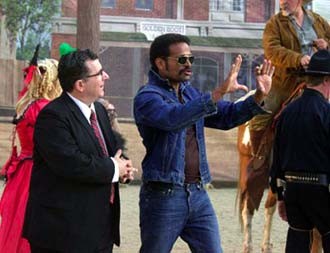|
America's Heart and Soul Dir. Louis Schwartzberg (PG) By virtue of timing alone, America's Heart and Soul, a slice-of-life series of stories released just in time for the flag-waving Fourth of July, has the dubious (and likely unwarranted) appearance of being Disney's substitute for Fahrenheit 9/11, which it declined to distribute. In any case, it's a blasé substitute for Michael Moore's incendiary look at Bush's reign, a documentary with no bite and even less bark. Certainly, both films wear their politics on their sleeves; however, where Moore's film incites conversation and debate, Schwartzberg's directorial debut fails to inspire, as if it were a fill-in-the-blank presidential campaign advertisement. In part, this is due to the unseen hand behind the camera. Love him or hate him, Moore's presence gives viewers a point of identification and creates a sense of connection between the disparate points in his films. Without Schwartzberg, there's little to connect the people he encountered and filmed in these 20-plus vignettes, beyond uncritical recitations of cliché elementary-school civics lessons: "Cherish your freedom," says the ex-alcoholic rancher. "It's the wonderful diversity of this country that makes this place so great," beams the Cajun musician, sitting upon land that has been in his family for 250 years. It's necessary to have self-discipline, says the Appalachian weaver. Hard work pays off for the dairy farmer who enjoys working seven days a week because, "You don't have to worry about going back to work on Monday when Sunday comes." And the bike messenger feels that coming in second place makes someone "the first loser." And so on, with affirmations of rugged individualism and the Protestant work ethic ad nauseam. During the segment about the West Virginia steelworkers who purchased their company, we hear them criticize foreign wages and the loss of manufacturing jobs. What could have become an inspiring tale of collective organizing and solidarity in the post-NAFTA world doesn't, unfortunately. America's Heart and Soul delicately skirts around this other America, instead offering positive messages that the sky's the limit and admonishing people to work hard in order to better themselves. These make for the film's feel-good stories - after all, who's going to argue with the blind mountain climber who has scaled the highest peaks on seven continents - but if the American Dream was as pervasive as we are led to believe then we wouldn't need so many constant reminders of its selling points. Who owned the land before the farmers' and ranchers' immigrant ancestors took it over? Who worked the land? What of their stories? — Alejandro Pérez
Dir. Mario Van Peebles; writ. Van Peebles & Dennis Haggerty; feat. Van Peebles, Joy Bryant, Ossie Davis, David Alan Grier, Paul Rodriguez, Saul Rubinek (R) In 1970, an up-and-coming black filmmaker shot himself in the foot: Melvin Van Peebles hatched a story so racially aggressive and supposedly unmarketable that no studio would touch it. So he made it on his own, in a slapdash effort that resembled a multicultural Ed Wood production. Sweet Sweetback's Baadasssss Song was not a good film by the usual yardsticks, but it was remarkable: It gave black audiences a new kind of hero; it made truckloads of money; and it inaugurated the "blaxploitation" movement, whose standard-bearers paled in comparison to Sweetback's surreal weirdness. Among the many questionable choices Van Peebles made was the use of his 13-year-old son in a sex scene. Three decades later, that son - Mario Van Peebles - pays complicated tribute to his dad by fictionalizing the making of the movie. And like his father, who played Sweetback when he was unable to use union actors, Mario plays Melvin the manipulative boss, the vain ladies' man, and the self-promoting revolutionary. The movie wants to work on two, maybe three, levels and doesn't quite hit any of its targets. It comes closest as a film-about-filmmaking comedy, one in which our fearless hero writes hot checks, tells lies, and courts unlikely investors to realize his dream. As a piece of myth-making, the film is unconvincing. A strong theoretical case could be made for Sweetback's political magnitude, but Baadasssss! expects to convince us with a few scenes in which his father is visited by inspirational visions. As a more personal statement, we can imagine that Baadasssss! means a great deal to its director. But even in the story's most intimate moments, as when Mario-as-Melvin insists that the fictional Mario do humiliating things on camera, the actor's performance conveys little beyond the screenplay's immediate demands. There's a ghost hanging over the film. Mario's father appears only at the very end, in a wordless, cigar-puffing shot that seems oddly defiant. The elder Van Peebles has contributed precious little to the cinema since inventing blaxploitation, yet here his son lionizes him; it's as if the father were still calling the shots, letting the youngster do the work while taking all the dubious credit for himself. — John DeFore
The Clearing Dir. Pieter Jan Brugge; writ. Justin Haythe; feat. Robert Redford, Helen Mirren, Willem Dafoe, Alessandro Nivola, Matt Craven, Melissa Sagemiller (PG) After their long trek through a mountainous forest, the captor tells his hostage, they will come to a clearing. There he has promised to deliver his prey to those who commissioned the abduction. The Clearing is the story of how a wealthy Pittsburgh businessman is kidnapped and marched through the woods. Based loosely on an actual crime in director Pieter Jan Brugge's native Netherlands, The Clearing is not so much a violent thriller as a study in three parallel lives that, in the non-Euclidean geometry of Justin Haythe's screenplay, eventually converge. The opening sequence crosscuts to show how Arnold Mack (Dafoe), Wayne Hayes (Redford), and Eileen Hayes (Mirren) each begin the day. Arnold, who was downsized out of the job he held for 17 years, awakens in what he calls "a household of disappointed people." He arrives by bus in time to intercept Wayne's Mercedes in the driveway of his estate. Eileen has just reminded her husband to be home in time for the dinner party she is preparing that evening, but she will soon be preparing a $10 million ransom package. The Clearing cuts back and forth between the forest, where Wayne and Arnold collide and confide, and the mansion, where Eileen, surrounded by her grown-up children and two agents from the FBI, tries to sort out her private feelings of anger, fear, and love. Preparing for the abduction, Arnold had been stalking Wayne, and there is nothing about the Hayes' marriage that escapes the prying eyes of the FBI, or the viewer. The pleasure that this understated film provides is not in guessing or discovering plot twists; the trailer already divulges the most shocking secret - Eileen did not know that Wayne was seeing another woman. The plot holds a viewer hostage to the spectacle of three superb actors thoroughly inhabiting their roles. "If you were in my shoes, wouldn't you do it?" asks Arnold, who regards his hostage as a luckier version of himself. Providing new footwear for their trek through the forest, Arnold in fact puts Wayne into his shoes. For the viewer and its imperfect characters, The Clearing is a strenuous exercise in empathy. — Steven G. Kellman
|















